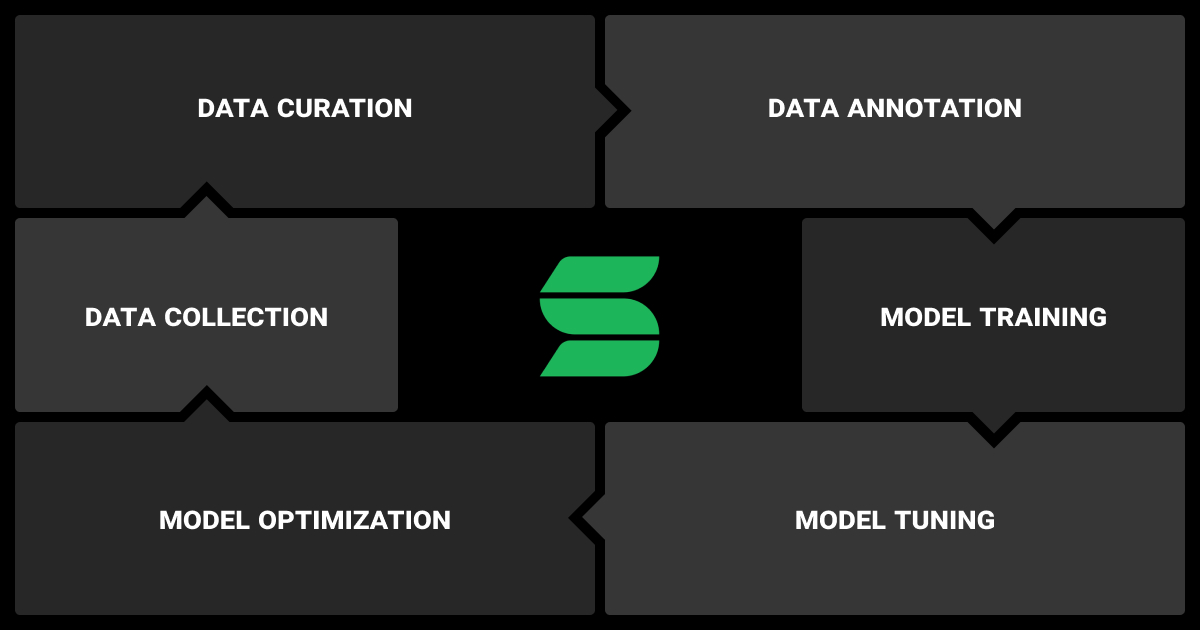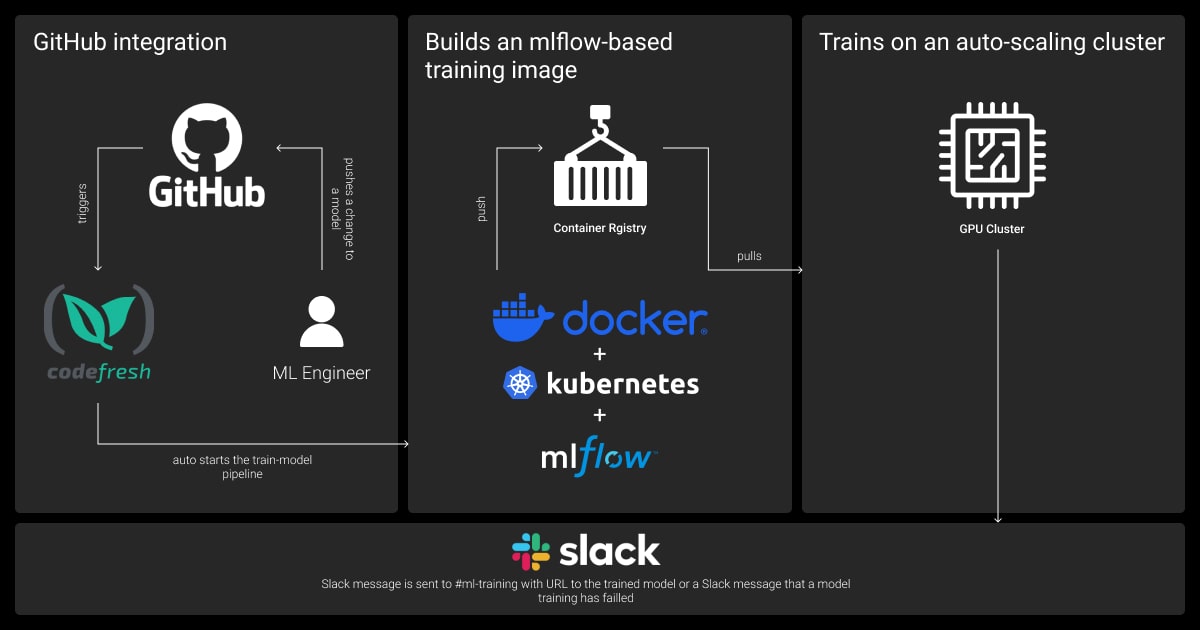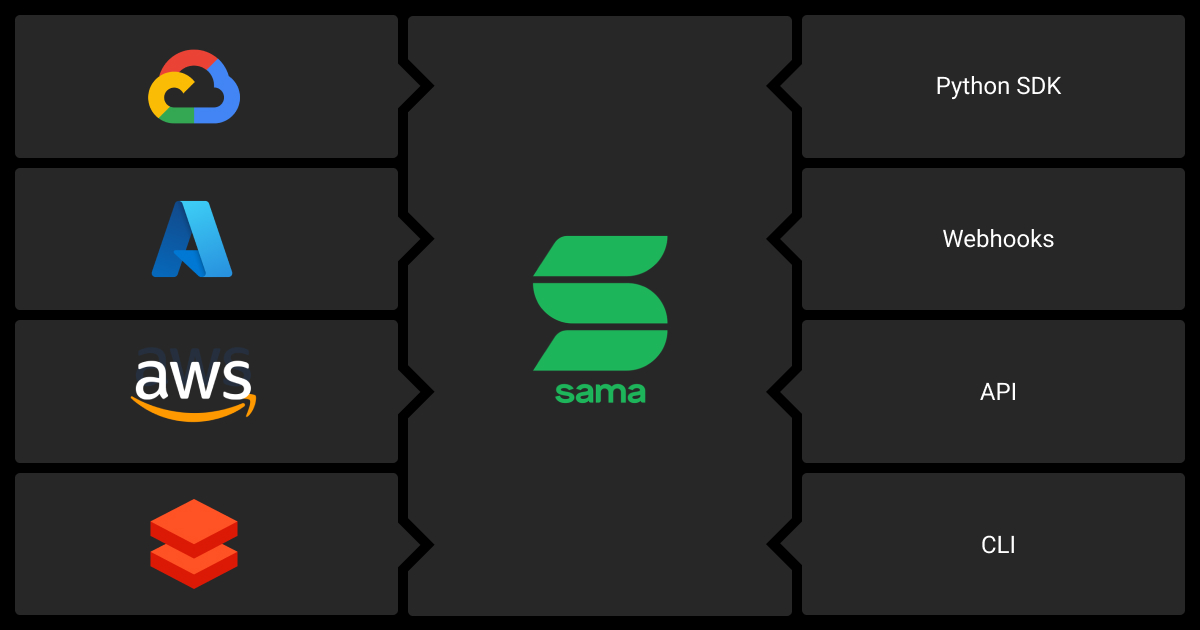Sama Company Review: Strengths, Weaknesses, and Considerations

High-quality labeled data is essential for training effective machine learning models. Hence, choosing the right data labeling vendor is fundamental for your project’s success.
This blog dives into Sama company review to see if their services align with your specific needs and can accelerate your ML model development.
How to Choose a Dataset Labeling Vendor?
Machine learning models rely heavily on labeled data for efficient training and testing. And there are two key methods to acquire such data: having your team labeling it internally or outsourcing the task to a specialized vendor.
If you’re considering the second method and Sama is one of the companies on your radar, this Sama review can help you make an informed decision and save hours of independent research on the vendor.
Here are the key factors to keep in mind when choosing a data labeling vendor:
Service and products
Dataset types
Data annotation tools
Integrations
Annotation process
Quality assurance
Pricing models
Security and data compliance
So, your ML project needs quality training data. Can Sama deliver? Let’s see.
Sama Overview
As Samasource was the company’s previous name, this article could be also seen as Samasource company review.
Sama, a certified B Corporation formerly known as Samasource, is a social impact data labeling company founded in 2008 by the inspiring entrepreneur Leila Janah. Witnessing the ambition of her students in Kenya, coupled with the global rise in literacy and technology access, an English teacher defined the mission of her future company.
Sama began as a data entry BPO service provider, but their focus shifted in 2012 to labeling tasks crucial for computer vision technology. This shift allowed them to create dignified employment opportunities for people in underserved communities across Kenya, Uganda, India, and several other countries.
With over 15 years of experience, Sama has become a trusted partner with an ethical AI approach for industry leaders like GM, Ford, and Google. Their expertise in AI data solutions is highly sought after. The company has its headquarters in San Francisco and an additional office in New York City. Sama directly operates delivery centers in Nairobi and Kampala, Uganda, with partnerships extending to other centers in India. While their reach has evolved, their commitment to empowering communities remains unwavering.
*In 2021, Facebook content moderators in Kenya sued Meta and their outsourcing firm, Sama. They alleged poor working conditions, including insufficient mental health support, low pay, and PTSD from exposure to graphic content. In 2023, both sides agreed to mediation to settle the case out of court, but negotiations reportedly broke down, and the moderators are seeking to proceed with a contempt of court case against Meta.
Sama Services & Products

Sama leverages human-in-the-loop expertise within its comprehensive platform to deliver annotated data and help enterprises de-risk their ML model development. They specialize in various data annotation services for 2D and 3D images, videos, LiDAR, sensor fusion, and generative AI. They also offer validation services for complex ML algorithms. Their services cater to industries like automotive, robotics, agriculture, retail, consumer tech, and manufacturing.
Sama services:
Sama Curate: This AI-powered tool intelligently identifies assets needing labeling within your datasets, saving time and improving model accuracy. It works on both pre-filtered and completely unlabeled data.
Sama Annotate: A team of highly-trained specialists provides high-quality data annotation (over 95% accuracy guaranteed) for images, videos, and 3D point cloud data.
Sama Validate: This managed service helps ensure enterprise AI models effectiveness by reviewing predictions and making necessary corrections.
Sama GenAI: This comprehensive solution addresses all your generative AI needs, including model evaluation, adversarial testing (“red teaming”), training data preparation, and fine-tuning.
Sama products:
The main product of the company is Sama Platform, an end-to-end data labeling and validation solution. Using algorithms and automation capabilities, this integrated ML-powered platform caters to a variety of AI model types, including computer vision, traditional machine learning, and generative AI. The platform offers functionalities across the entire data annotation lifecycle:
Data Pre-processing: Tools are available to prepare and clean data before the annotation process begins.
Task Management and Distribution: Users can create, prioritize, and distribute annotation tasks for efficient workflow management.
Annotation Tools: The platform provides advanced annotation tools to expedite and enhance the data labeling process.
Quality Management: Sama Platform integrates both manual and automated quality control measures to ensure data accuracy.
Post-processing: Tools are available to refine and finalize labeled data before integration with machine learning models.
Task Delivery: The platform facilitates the delivery of labeled data to development teams. It offers flexible delivery options to integrate seamlessly with existing workflows. Users can track the progress of annotation tasks and data delivery in real-time.
Sama Dataset Types
Sama company supports several dataset types for computer vision annotation projects only:
Image datasets: The datasets that contain still images that Sama can annotate with various methods, including:
Bounding boxes: Used to identify and enclose objects in the image.
Polygons, keypoints & points: Used for more complex object shapes or specific points of interest.
Segmentations: Involves instance and semantic segmentation methods.
Lines and arrows: Highlighting specific pathways or directions within the image.
3D Sensor Fusion datasets: This involves combining data from multiple 3D sensors like LiDAR and cameras. Sama supports:
3D Cuboid annotations: Annotations for box-shaped objects in 3D space.
3D Orthographic Shapes: Annotations for various 3D shapes besides cuboids.
Fused Annotation: Combining annotations from different sensors for a comprehensive understanding of the 3D scene.
Video datasets: Sama can also handle video annotation projects, where each frame of the video can be annotated using the image dataset methods mentioned earlier.
Overall, Sama specializes in annotating various data formats, from 2D images to complex 3D sensor fusion projects. However, you should keep in mind that the vendor works only with data labeling for computer vision tasks.
Sama Data Annotation Tools

Sama offers a powerful toolkit for image annotation that prioritizes efficiency, data accuracy, and streamlined project management. Some of their solutions include ML-assisted annotation (MAA), crosshair tool, visual feedback on label selection, logically grouped tasks, and keyboard shortcuts.
ML-Assisted Annotation (MAA): This tool, powered by MICROMODEL technology, leverages pre-trained models to suggest labels, potentially accelerating the annotation process.
Five-step QA mechanism: A five-step quality assurance process is employed to assess worker performance and ensure data accuracy.
Data Curation Tools: These tools prioritize labels based on their impact on model performance, potentially optimizing annotation efforts.
SamaIQ: This technology combines human expertise with algorithms to potentially reduce bias and enforce privacy or compliance standards.
SamaHub: This platform facilitates communication and project management by offering collaboration tools, self-service data sampling, and reporting features.
Sama Integrations

Moving on with our Sama review, the vendor offers various integrations to connect with their platform and manage your data annotation projects efficiently.
APIs and Tools:
REST API: This core integration allows programmatic access to the Sama platform. You can manage projects, create and edit tasks, and interact with the platform beyond the standard user interface.
Python SDK and CLI: These tools simplify interaction with the Sama API for developers. They provide functions for common tasks like uploading data and managing projects, reducing the need for custom code.
Data Transfer:
Cloud Storage Integration: Sama integrates seamlessly with major cloud storage providers like Azure Blob Storage, Google Cloud Platform, and AWS S3. This allows you to directly access images, videos, and 3D assets for annotation without downloading them. Sama ensures data security by not retaining copies on their servers.
Pre-processing and Transformation: Sama automatically processes specific assets like videos and 3D models to ensure compatibility with their platform. These processed versions can be saved back to your cloud storage for efficient access by annotators.
Storage Options:
Direct Cloud Storage Access: If preferred, you can maintain complete control over your data by uploading and accessing assets directly from your existing cloud storage.
Sama S3 Storage: Sama also offers its own secure S3 storage options located in Germany, USA, and India. This can be a convenient alternative for storing and managing your data within the Sama platform.
By leveraging these integrations, you can streamline your data annotation workflows, improve efficiency, and maintain control over your valuable data assets.
Sama Annotation Process
Sama offers a secure cloud-based platform to manage the entire image annotation lifecycle, ensuring smooth collaboration and high-quality results. Here's a breakdown of their process:
Secure Platform and Team:
Secured Cloud Platform: Sama utilizes a secure cloud environment to manage image uploads, annotation tasks, data quality checks, and delivery.
Dedicated Team: A team of trained specialists is assigned to your project, including annotators, project managers, engineers, and quality analysts. This team undergoes specialized training to become experts on your specific data.
Collaborative Planning:
Consultation: Sama's dedicated account team collaborates with you to design a robust data quality strategy and annotation workflow. This ensures the process aligns with your project's specific needs, even for complex tasks.
Data Annotation and QA:
ML-powered Platform: Annotators leverage Sama’s machine learning-powered platform to streamline the annotation process. This may involve features like pre-suggested labels or automated quality checks.
Multi-level Quality Management: A multi-layered quality control process is implemented. This includes Sama review performed by humans and potentially automated features like Auto QA to identify and address errors or inconsistencies early on.
Delivery and Support:
Customizable Reporting: Sama provides detailed analytics and reporting on your training data, giving you valuable insights into its quality and performance.
Automated Data Management: Leverage Sama's command-line interface (CLI) and APIs to automate data transfers, task prioritization, and real-time results retrieval.
This comprehensive approach ensures an efficient annotation process while providing you with control and transparency throughout the process.
Sama Quality Assurance (QA)
Sama uses a three-way approach to assessing the quality of the performed annotation, depending on the specific needs of the project:
Internal QA: Sama reviews tasks with their team of QA managers using a combination of manual and automated techniques. This ensures a baseline level of quality across all projects.
Client-driven QA: For projects where the client has specific requirements, a data scientist on the client’s team performs a separate, manual QA process.
Automated QA (Auto QA): To improve efficiency and catch errors early on, Sama developed Auto QA. This system uses automated logic checks to identify potential issues in the data before tasks are even submitted. This frees up human QA specialists to focus on more complex issues and edge cases.

Sama Pricing
Sama doesn’t publicly disclose their pricing information. This is common for data labeling services, as the cost can vary depending on several factors. Here’s what we know about Sama’s pricing:
Per-feature model: Sama likely uses a per-feature pricing model, where the cost depends on the specific services you need. This could include factors like data complexity, project size, and turnaround time.
Contact for quote: You'll need to contact Sama directly to get a quote for your specific needs. This allows them to tailor the price to your project requirements.
By contacting Sama and referencing rates from similar services, you'll be better equipped to understand their pricing structure for your data labeling project.
Sama Security and Data Compliance
The final factor in our Sama company review is data security. Sama emphasizes security and data compliance throughout their data annotation process. Here are the key points:
Standards and Certifications:
ISO 9001: Ensures a quality management system for consistent service delivery.
ISO 27001: Focuses on information security management to protect data.
EU GDPR Compliant: Follows the General Data Protection Regulation for data privacy in the European Union.
TISAX: Meets the Trusted Information Security Assessment Exchange for the automotive industry in Germany.
Physical and Logical Security:
ISO certified delivery centers: Ensures physical security measures are in place.
Biometric authentication: Uses fingerprints or facial recognition for secure user access.
Two-factor authentication (2FA): Adds an extra layer of security when logging in.
Data Protection Measures:
Automated security scanning: Regularly checks for vulnerabilities in their systems.
External penetration testing: Simulates cyberattacks to identify weaknesses.
Data encryption: Protects data at rest and in transit using industry standards.
Data Privacy Compliance:
GDPR and CCPA compliant: Ensures data privacy rights for users in the EU and California.
As you can see, Sama implements various measures to protect user data throughout the annotation process.
Top Sama Alternatives
Our Sama company review provides valuable insights. To get a comprehensive view of the data labeling landscape, consider researching other providers as well:
Label Your Data
At Label Your Data, we help data scientists and operation managers to develop groundbreaking ML models. Our global, multilingual team of experts tackles the time-consuming task of data labeling for computer vision and NLP projects, ensuring best-in-class data annotation solutions. We offer a free pilot, adaptable pricing models, and tool-agnostic teams. Most importantly, your data remains secure with our industry-standard certifications like PCI DSS Level 1, ISO:27001, GDPR, and CCPA.
SuperAnnotate
SuperAnnotate is an AI-powered image annotation platform that helps businesses build, fine-tune, and manage machine learning models. They offer an annotation tool, access to a global marketplace of vetted annotators, and project management services. As analyzed in our SupperAnnotate company review, the vendor also provides data management, MLOps & Automation tools, and features for LLMs & GenAI services. SuperAnnotate supports various data types and offers a free trial and multiple pricing plans.
Kili Technology
Kili Technology company is a data labeling platform that helps businesses and data scientists construct high-quality ML datasets. They offer a self-annotation platform with features for various data types, a global workforce of annotators, and expert guidance from Machine Learning Engineers. Their platform integrates with popular cloud storage solutions and offers tools to ensure data quality.
FAQ
What are Sama’s core capabilities for machine learning projects?
Sama specializes in data annotation and validation, a crucial step in training machine learning (ML) algorithms, particularly those focused on computer vision. For a brief Sama overview, their core capabilities include image and video annotation, 3D point cloud annotation, and QA.
What factors should I consider when deciding if Sama is a good fit for my ML project?
If your machine learning project involves computer vision tasks like object detection, and requires high-quality labeled data at scale, Sama’s expertise and scalability could be a good fit. However, consider your project’s data security needs and budget, as Sama might not be the most cost-effective option for all scenarios.
What are the potential drawbacks or limitations of working with Sama?
While the company excels in computer vision data labeling according to Sama reviews, they don’t offer Natural Language Processing services. Additionally, data annotation can be expensive, and Sama’s pricing structure might not be the most budget-friendly depending on your project size.
Written by
Karyna is the CEO of Label Your Data, a company specializing in data labeling solutions for machine learning projects. With a strong background in machine learning, she frequently collaborates with editors to share her expertise through articles, whitepapers, and presentations.

